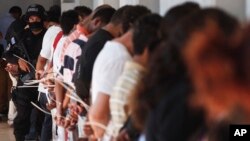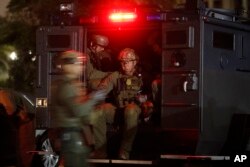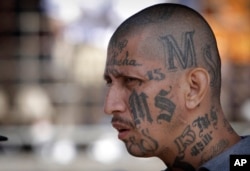The U.S. Justice Department is taking the fight against the Central American street gang known as MS-13 to its home turf – the so-called “northern triangle” countries of El Salvador, Guatemala and Honduras.
With roots among war refugees from El Salvador in Los Angeles in the 1980s, MS-13, also known by its Spanish name “Mara Salvatrucha,” has morphed into one of the largest and most violent gangs in the United States, boasting an estimated 10,000 members.
But much of its leadership remains in El Salvador from where they plan and orchestrate “some significant murders” in the U.S., cases that local prosecutors are unable to investigate, according to Kenneth Blanco, assistant attorney general in charge of the department’s criminal division.
Watch: US Steps up Fight Against Flourishing MS-13 Gang
Taking fight to home turf
As part of its fight against the gang, the Justice Department’s criminal division coordinates with the Central American governments to gather leads and evidence for prosecuting gang members in the United States and to target others “before they ever reach U.S. ports of entry,” Blanco told a Senate Judiciary Committee hearing on MS-13 Wednesday.
“The department’s ultimate goal is to dismantle the entire leadership structure of MS-13, including those members who reside overseas,” Blanco said.
To that end, FBI-vetted investigative units in El Salvador, Guatemala and Honduras probe MS-13 and other gang members, he said, while another Justice Department unit sends prosecutors overseas to combat gangs, cartels, financial crimes, public corruption and other transnational criminal activities.
But Congress can provide resources to aid in the fight against MS-13, Blanco told the committee.
“I think what we need to do is be able to take the fight to them,” he said. “The other is resources to help identify the bad actors here and remove those bad actors from this country and send them back from which they came.”
Terrorist organization?
President Donald Trump, blaming the Obama Administration’s “lax” immigration policies for allowing MS-13 to flourish, has vowed to do exactly that.
“MS-13 is soon going to be gone from our streets very soon, believe me,” Trump said last month.
Attorney General Jeff Sessions has called the gang “one of the gravest threats to American safety,” and he suggested in a television interview in April that it could be designated as a terrorist organization.
Sessions later said he wasn’t certain whether the gang, the first street gang to be labeled a transnational criminal organization by the U.S. Department of Treasury, meets the State Department’s standards for terror designation.
Alex Nowrasteh, a fellow at the libertarian Cato Institute in Washington, said it is “unfair to blame President Barack Obama for what happened.”
“What we see – and the data is pretty clear on this – is that, immigrants, whether legal or illegal, are much less likely to commit violent or property crimes in the United States than the native born Americans,” Nowrasteh said.
Gang recruiting
MS-13 actively recruits members among immigrant communities from the northern triangle, including youngsters and recently arrived children from Central America. But just how many MS-13 gang members entered the U.S. as children remains unclear.
In recent years, only a handful of Central American children detained at the U.S.-Mexico border have had gang roots. Of the nearly 250,000 unaccompanied minors from the Central American countries arrested since 2012 – the majority of them between the ages of 14 and 17 – only 160 were gang members, Carla Provost, acting chief of the U.S. Border Patrol told the Senate panel.
The number of Central American minors arrested at the U.S. Southwest border reached nearly 60,000 in fiscal year 2016, but it has plummeted this year as law enforcement has clamped down on illegal immigration. In May, the U.S. Border Patrol agents detained 1,493 unaccompanied minors from Central America, down 73 percent from 5,594 in May 2016, according to Provost.
Working with other law enforcement agencies, Immigration and Customs Enforcement agents have stepped up arresting gang members. In a recent anti-gang sweep around the country, ICE agents arrested 1,378 people, including 1,095 gang members or gang associates.While 445 of the detainees were foreign born, most were U.S. citizens, according to ICE.








